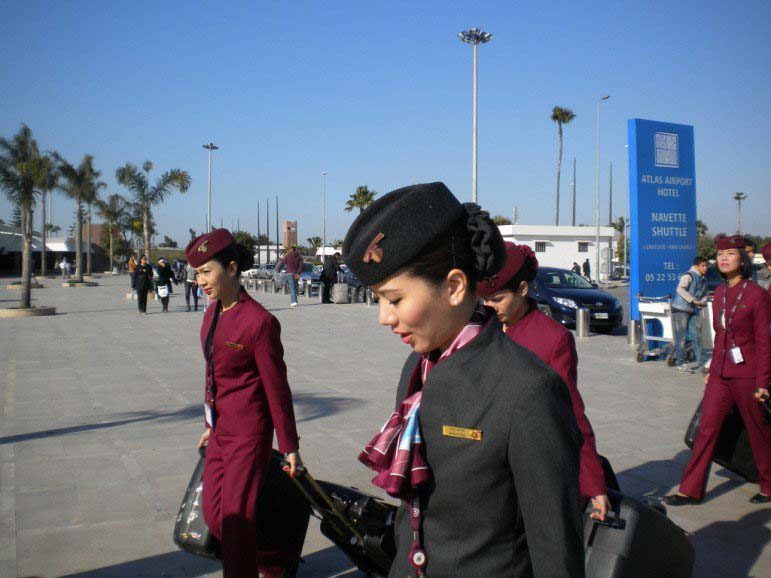
Holding Qatar to a UN convention it signed that bans discrimination, the International Labour Organization (ILO) has called on the country’s national carrier to scrap several working stipulations for its female employees.
Specifically, Qatar Airways must do away with its policy of dismissing flight attendants who become pregnant and banning them from accepting rides from male friends to and from their home, the ILO said.
The UN agency highlighted its conclusions in a report released this week that investigated complaints filed by two labor advocacy groups, the International Trade Union Confederation (ITUC) and the International Transport Workers’ Federation (ITWF).
The latter group has been a long-standing critic of Qatar Airways, accusing it of “flagrant abuses” and discrimination against women, who comprise 80 percent of the airline’s 9,000 cabin crew employees.
Investigation results
Though the ILO urged the carrier to change some of its policies, the body did not agree with all of the allegations made by the trade groups.
For example, ITUC and ITWF have also accused Qatar’s state-owned airline of discriminating against its female employees by mandating a 12-hour rest period before starting a shift, and by maintaining security surveillance of employee accommodation.

However, the ILO concluded that there was insufficient evidence to suggest that either measure has a disproportionately harsh impact on women.
The agency also found that Qatar Airways has removed an employment contract clause that previously required cabin crew to obtain the airline’s permission before marrying.
A revised contract was introduced in December 2014 for new employees, and the carrier told the ILO that it’s in the process of similarly amending employment agreements of all its existing staff.
Labor activists have said their campaign was the driving factor behind the airline’s decision to revise its contract.

“Qatar Airways has been shamed into action – and more must come,” stated ITUC general secretary Sharan Burrow, who also advocates on behalf of construction workers in Qatar and wants the Gulf state stripped of the 2022 World Cup unless it introduces drastic reforms.
“We … will not rest until it addresses what many of those workers call the ‘climate of fear’ at (Qatar Airways).”
A spokesperson for the airline was not immediately available to respond to the ILO report.
However, Qatar Airways CEO Akbar Al Baker reportedly dismissed its findings while speaking to reporters on the sidelines of the Paris Air Show yesterday.
“I don’t give a damn about the ILO – I am there to run a successful airline. This is evidence of a vendetta they have against Qatar Airways and my country,” Reuters quoted Al Baker as saying.
Flying while pregnant
In its response to the complaint, the Qatar government told ILO investigators that the country’s civil aviation rules effectively prohibit cabin crew from flying while pregnant. This means that these flight attendant would be unable to meet their contractual obligations.
However, the government noted that the women are free to apply to other jobs within Qatar Airways that don’t involve flying, such as working in an airport lounge.

The ILO countered that argument by saying being forced to apply for an alternative job is a burden on pregnant women and creates inequality in the workplace. The bottom line, it added, is that a woman should not lose her job solely because she becomes pregnant.
Instead, the the airline should change its policy and temporarily transfer pregnant employees who cannot fly to another position within the company, the agency said.
However, Al Baker has previously called that practice impractical.
Qatar Airways only has a limited number of ground roles it can offer pregnant cabin crew members who cannot fly, he said in March 2014:
“We are not in the business where we can guarantee ground jobs or let people stay away … and don’t do anything for the airline,” he said.
‘Cultural norm’
The government also stood by the airline’s prohibition on female employees entering or leaving company premises with a man who is not their father, brother or husband. Such measures, the government said, are needed to comply with “a particular cultural norm in Qatar.”
The ILO countered that since this requirement does not apply to men, it amounts to discrimination based on sex. The agency called for the rule to be scrapped.

The broader issue of employee surveillance and monitoring was also investigated by the ILO.
The government said that security cameras at the entrances of staff accommodation buildings are standard in Qatar, and investigators said there was insufficient evidence to conclude that such measures disproportionately affect female employees.
However, the ILO noted that there were indications that management’s surveillance practices had specifically targeted several women employees.
While it did not provide any specific examples, one incident picked up by international media earlier this year involved a photo taken from security camera footage showing a female Qatar Airways staffer passed out in the doorway of her accommodation.
The picture was emailed throughout the company by an airline executive to remind staff to respect Qatar’s customs, a spokesperson previously said.
But some critics took offense at the suggestion that the long-time employee was drunk, and some observers suggested that she could even have been drugged. Others asked why security personnel, who apparently spotted the woman, did not help her.
Filing complaints
The ILO said its investigation also has raised wider questions about how Qatar Airways deals with allegations of harassment. While the government said there are various dispute settlement mechanisms in place, the ILO noted that no details were provided on how these procedures can be or have been used by cabin crew employees.
“Access to such procedures and remedies by cabin crew members who are migrant workers may be difficult because of the fear of victimization or reprisals, including dismissal and deportation from the country, which may prevent the employees from seeking to obtain redress in case of violation of their rights,” the agency said.
The ILO recommended that Qatar Airways establish a system that allows employees to file a complaint without being sanctioned, and that the government hire more female labor inspectors to monitor discrimination and equality issues at the airline.
Here’s a copy of the full report:
Thoughts?







